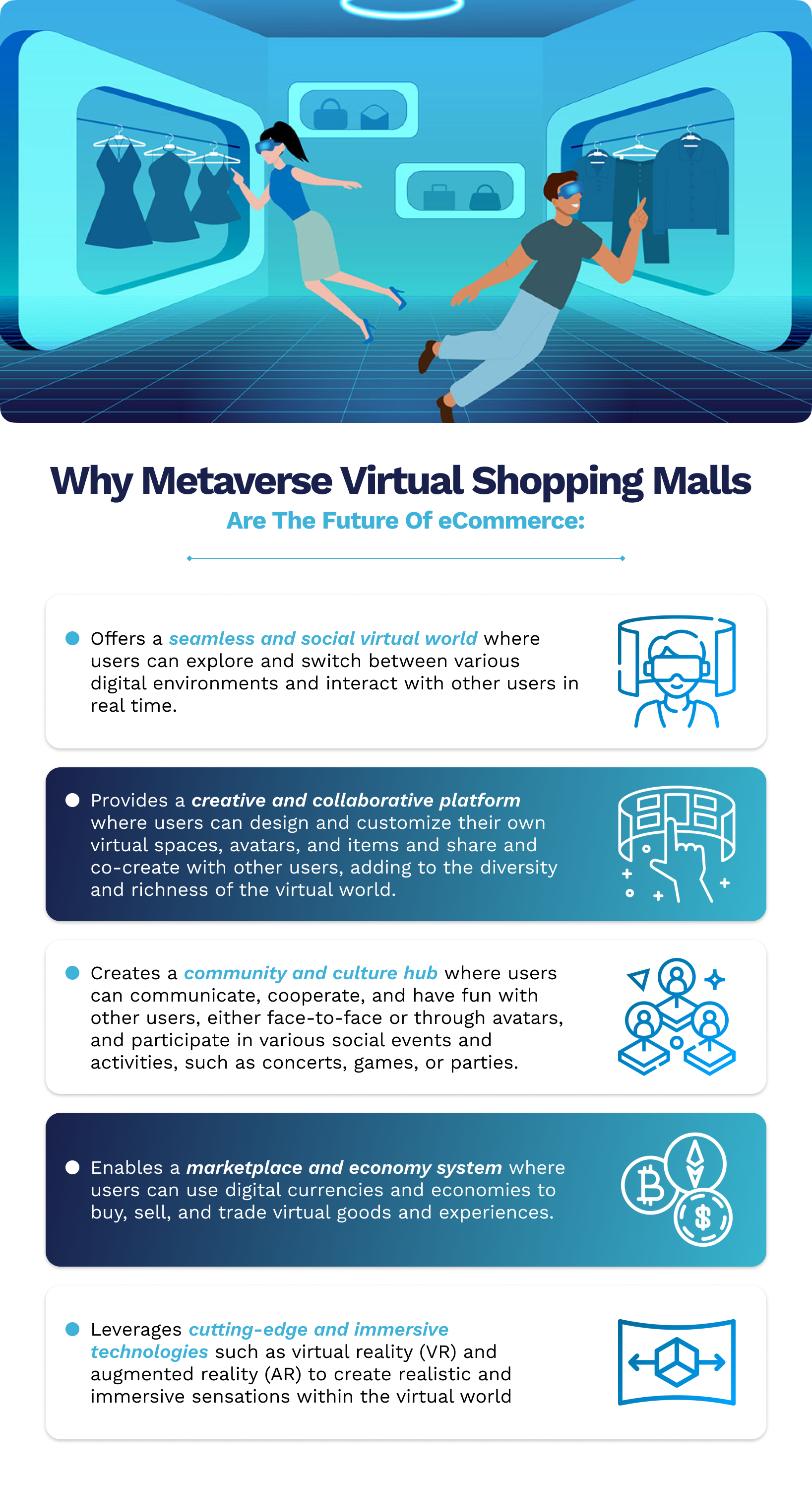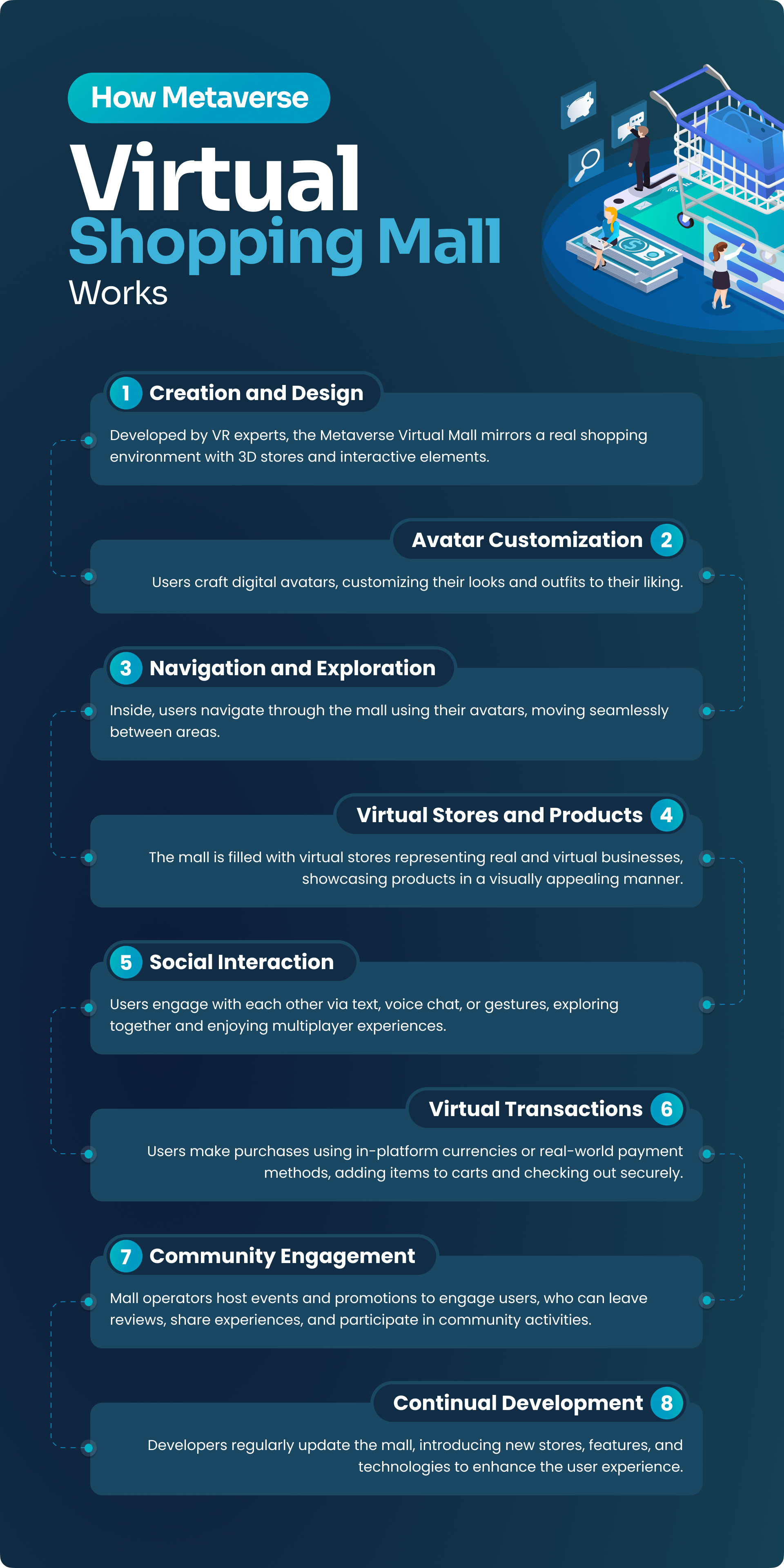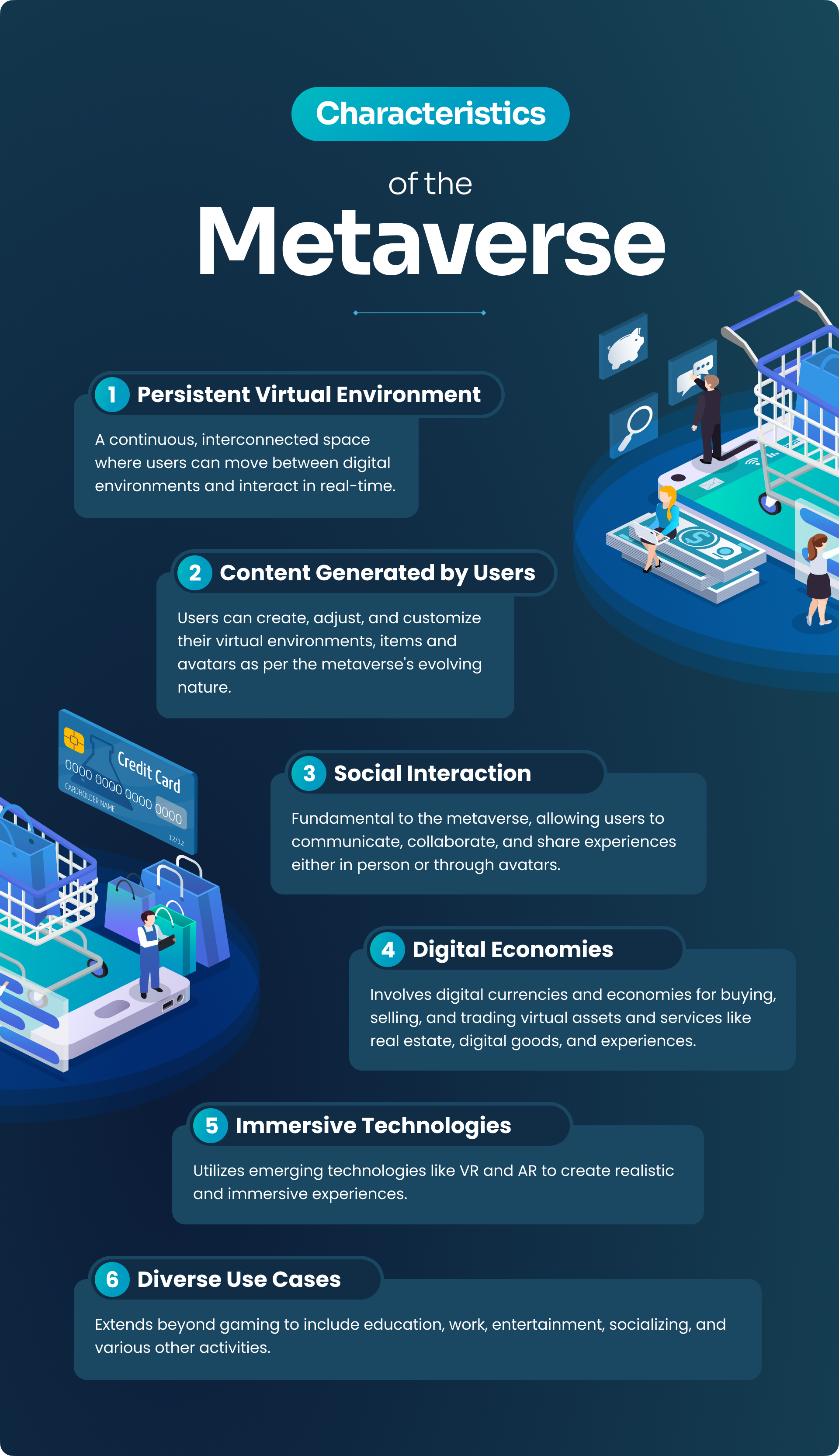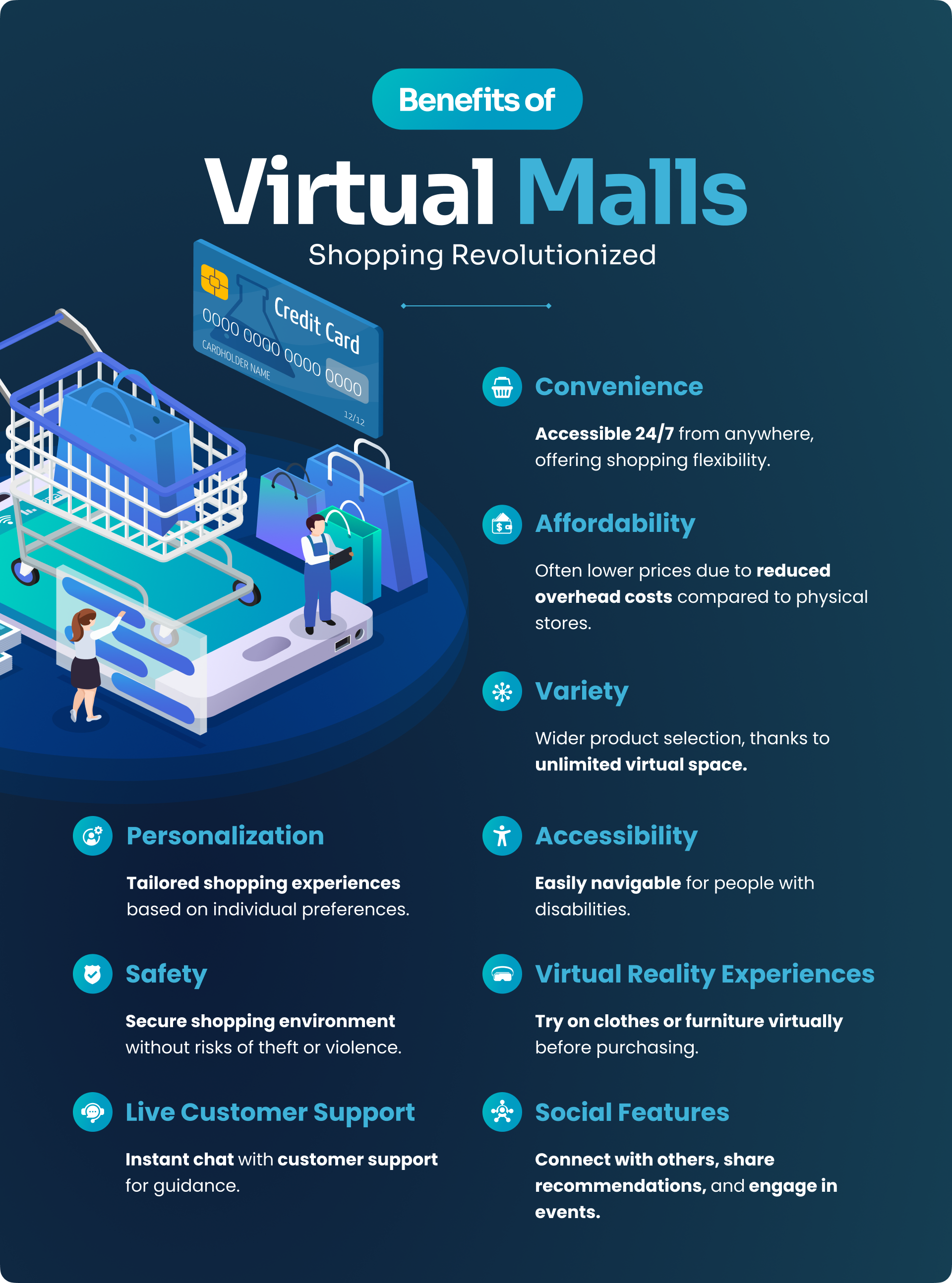


Imagine a world where you can shop for anything you want, from anywhere you are, without leaving your home.
A world where you can browse through thousands of products, try them on, and interact with other shoppers and sellers in a realistic and immersive environment. A world where you can experience the thrill of shopping in a mall, without the hassle of traffic, parking, crowds, or queues.
Well, this is the world of virtual reality we are talking about, and it has just gotten more exciting with Metaverse virtual shopping malls!
Virtual shopping malls are the future of virtual reality eCommerce where the boundaries between the digital and physical worlds blur into an immersive experience unlike any other!
Read this article to learn all about what virtual shopping malls in virtual reality eCommerce are, their rise, and the impact of this technological evolution on the e-commerce landscape.
Virtual reality (VR) is a computer-generated experience that transports the user to another reality by immersing him/her into the experience. It is a computer-generated simulation of an immersive, interactive 3D environment that can be explored and interacted with by a person, typically using special electronic equipment.
VR can be experienced through devices such as headsets, gloves, or suits that provide sensory feedback such as sight, sound, touch, or even smell. Unlike traditional UI options, VR immerses the user inside of an experience.
VR has many applications, from entertainment and education to healthcare and business.
Examples of VR include:
Some of the games that illustrate this are Beat Saber, Job Simulator, and Half-Life: Alyx.
For instance, pilots can practice flying in a virtual cockpit before actually getting into a real plane.
For instance, Lowe’s and IKEA offer VR showrooms for customers to preview furniture at home and customize it.
For instance, students can visit the Giza Plateau in Egypt, where Harvard and Boston’s Museum of Fine Arts conducted archaeological excavations.
For example, patients with social anxiety can practice public speaking, assertiveness, or conversation skills in a VR environment.
Virtual Shopping Malls, the fusion of Virtual Reality (VR) and E-Commerce are transforming how we shop online!
Virtual Shopping Malls are online platforms that replicate the experience of shopping in a physical mall. They are virtual reality eCommerce stores that provide a virtual environment where users can browse stores, interact with products, and make purchases.
They are here to offer a reality where you can stroll through a virtual mall, browse products, try them on virtually, and make purchases—all from the comfort of your home.
In a Metaverse virtual shopping mall (Metaverse is a collective virtual shared space, created by the convergence of virtually enhanced physical reality and physically persistent virtual reality), users can interact with each other and the environment in real-time, creating a social shopping experience.

Who doesn’t love shopping!! It is undoubtedly one of the most enjoyable and favorite activities for many. With the advancement of technology, virtual reality eCommerce has emerged as the most innovative way to enhance the shopping experience.
In the past, shopping was mostly done in physical stores, where shoppers had to travel to the location, browse through the products, try them on, and pay at the cashier.
However, shopping in physical stores also had some disadvantages, such as:
With the development of VR technology, shopping has become more accessible and convenient. Shoppers can use devices, such as headsets, gloves, controllers, and treadmills to experience a virtual shopping environment, where they can browse, select, and buy products and services.
Shopping with VR comes with perks like:

Now, virtual shopping malls are the next level of VR shopping, where shoppers can experience a more realistic and social shopping environment.
Virtual malls are online platforms that simulate the layout and atmosphere of a physical shopping mall, where shoppers can visit different stores, interact with other shoppers and staff, and enjoy various activities and events.
Some key advantages of the advanced stage of virtual reality eCommerce, i.e., virtual shopping malls are:

eCommerce has been growing rapidly in the past decade, as more and more consumers prefer to shop online for convenience, variety, and affordability.
However, e-commerce also has some limitations and challenges, such as a lack of physical interaction, social engagement, and immersive experience. That is why many e-commerce platforms and brands are looking for ways to leverage the power of virtual reality (VR) and the metaverse to create a new and innovative way of shopping online.
The metaverse is a term that describes a shared, persistent, and interactive virtual space that encompasses various digital worlds and experiences.It is powered by technologies such as VR, augmented reality (AR), blockchain, artificial intelligence (AI), and cloud computing and allows users to create and customize their own avatars, explore and interact with different environments and objects, and connect and communicate with other users and entities.
One of the most promising applications of the metaverse is virtual reality eCommerce and virtual malls, which are online platforms that simulate the experience of a physical shopping mall, but in a digital format.
Yes, the Metaverse Shopping Mall is a digital realm that merges physical and virtual worlds, offering an immersive shopping experience.
Here,

Metaverse virtual malls offer several advantages over traditional e-commerce, such as:
You see, Metaverse virtual malls are the future of eCommerce, as they can offer a more immersive, social, personalized, and convenient shopping experience than traditional e-commerce.

Virtual reality eCommerce isn’t just a trend; it’s a game-changing revolution in online shopping! One of the most exciting examples is Metaverse virtual shopping malls, the ultimate future of online retail where users can enjoy a seamless, social, creative, and immersive shopping experience.
But how can your business hop on this trend and join the Metaverse virtual shopping revolution? Enter Klizo Solutions! As a leading tech-based eCommerce development service, we specialize in creating virtual reality eCommerce platforms that seamlessly integrate with Metaverse virtual shopping malls.
With Klizo Solutions, you get expertise, experience, and cutting-edge technology to design, develop, and deploy your virtual reality eCommerce solutions. We’ll ensure they’re optimized for performance, security, and user satisfaction, helping you tap into the vast potential of virtual reality eCommerce.
Partner with us today to future-proof your business and unlock the exciting world of eCommerce. Klizo Solutions is your trusted partner for virtual reality eCommerce development!
Previous article
Why Outsource eCommerce Development with Agile Methodology in 2024
Joey Ricard
Klizo Solutions was founded by Joseph Ricard, a serial entrepreneur from America who has spent over ten years working in India, developing innovative tech solutions, building good teams, and admirable processes. And today, he has a team of over 50 super-talented people with him and various high-level technologies developed in multiple frameworks to his credit.

Subscribe to our newsletter to get the latest tech updates.